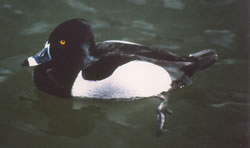|
Birding in Winter |
|
I look forward to the weather. Foul weather brings birds down off of the mountains or drives some of those northern species southward. Though I may not get common redpolls at my feeder, chances are that some evening grosbeaks will arrive if the mercury drops. But until that happens, I’ll have to be content with the current weather and start setting up for the winter birds.
Some years we make suet balls out of rendered beef fat and mix in nuts, seeds or chopped fruit. I hang them out of dog reach - imagine horrible smelling belches - and place a pan or dish to collect the droppings. These balls will attract chickadees, woodpeckers, magpies, scrub jays, and nuthatches and the pan is necessary to catch the pieces that flake off from the ball. Again, my dog has learned to search the drop zone for pieces of high-energy fat.
When I’m not in the yard, one area I go birding in is the Scott M. Matheson Wetlands Preserve. It helps that I work there, but some days I venture off with binoculars in tow and leave the office cares behind. The diverse habitats there attract a number of songbird species and those that come to feed upon them. Numerous sharp-shinned and Cooper’s hawks patrol the woodlands for juncos and sparrows, while harriers course over the wetland areas in search of blackbirds, wrens and small rodents. Of course, the open water areas attract the waterfowl - ring-necked ducks, Canada geese, green-winged teal, wood ducks, and mallards. About fifteen species of waterfowl may be regularly observed in the Preserve in winter. Another great spot for waterfowl is the pond at Old City Park. Among the mutant ducks and militant geese are American widgeons, wood ducks and others. If you sneak up onto the stage and peer over the half-wall, you’ll get a better chance to see the ducks on the pond, versus just in flight. Another great winter birding location is the old highway between Crescent Junction and Cisco. Numerous bald and golden eagles, ferruginous and red-tailed hawks, and prairie falcons may be viewed from a vehicle as the birds perch upon the telephone poles that line the roadway. Though the area looks abandoned and lifeless, it teams with activity.
Happy Birding Holidays!
|
© 2001 Moab Happenings. All rights reserved. Reproduction of information contained in this site is expressly prohibited.
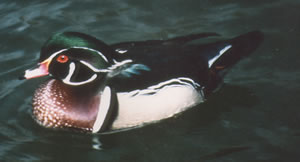
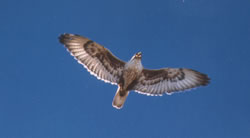

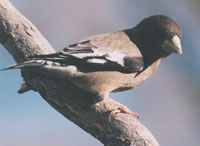 So
let’s start in my backyard. We have a couple of feeders
out for winter finches. I like to use a tube feeder with niger
thistle seed for American and lesser goldfinches, and hope
that some pine siskins will show. Though the American’s
are in drab winter plumage, the male lessers look sharp in
their black overcoats. Both of these birds feed upside down
- they hang from a wooden perch and feed at the tiny ports.
This type of feeder eliminates the house sparrows - who eat
like starved dogs - who wolf down available seed. I also reduce
the millet-dominated seed mixes for they encourage the house
sparrows to linger like unwanted holiday guests.
So
let’s start in my backyard. We have a couple of feeders
out for winter finches. I like to use a tube feeder with niger
thistle seed for American and lesser goldfinches, and hope
that some pine siskins will show. Though the American’s
are in drab winter plumage, the male lessers look sharp in
their black overcoats. Both of these birds feed upside down
- they hang from a wooden perch and feed at the tiny ports.
This type of feeder eliminates the house sparrows - who eat
like starved dogs - who wolf down available seed. I also reduce
the millet-dominated seed mixes for they encourage the house
sparrows to linger like unwanted holiday guests. 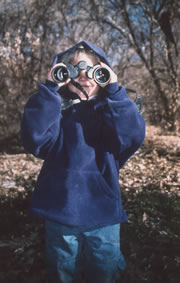 Another
source of winter fat for the birds is peanut or almond butter
which I smear directly onto the tree trunk in our front yard.
It may take a couple of applications, but soon nuthatches
and brown creepers will be viewed out our front window.
Another
source of winter fat for the birds is peanut or almond butter
which I smear directly onto the tree trunk in our front yard.
It may take a couple of applications, but soon nuthatches
and brown creepers will be viewed out our front window. 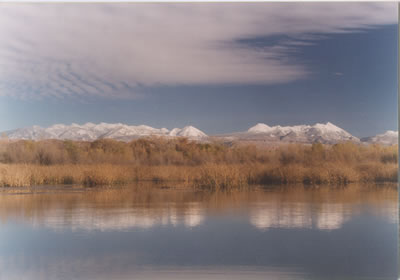 Of
course, the list goes on. There are many great locations in
Moab to watch birds in December. In addition, there is the
Christmas Bird Count which will be held on January 5, 2002.
I think this year is the 103rd running of the count and it
is a great way to share your birding enthusiasm with others,
and to get in a little winter birding while others anxiously
await spring thaw. If you are interested in participating
in this year’s count, contact Rick Boretti or Andrea
Brand at 259-4050.
Of
course, the list goes on. There are many great locations in
Moab to watch birds in December. In addition, there is the
Christmas Bird Count which will be held on January 5, 2002.
I think this year is the 103rd running of the count and it
is a great way to share your birding enthusiasm with others,
and to get in a little winter birding while others anxiously
await spring thaw. If you are interested in participating
in this year’s count, contact Rick Boretti or Andrea
Brand at 259-4050.